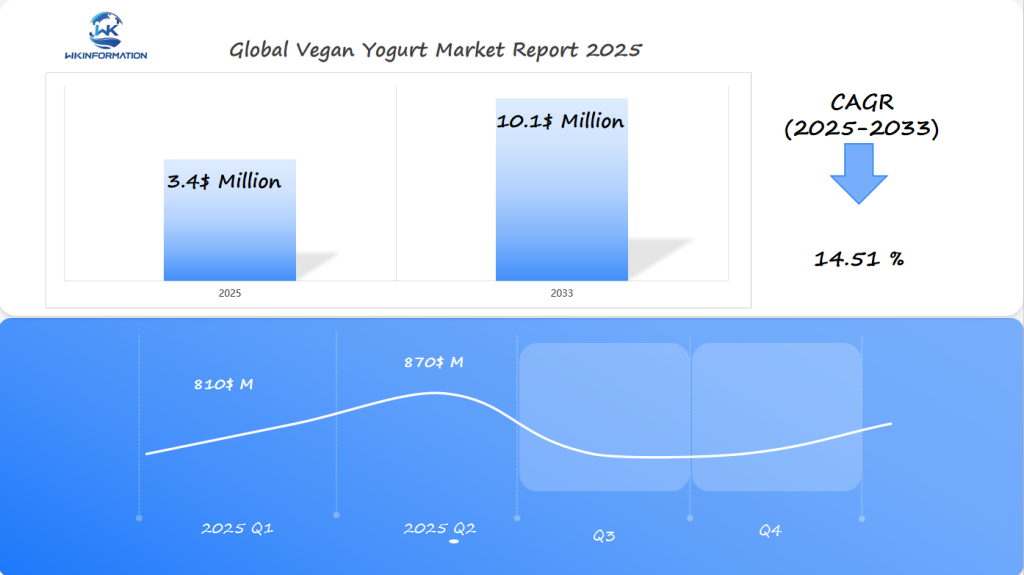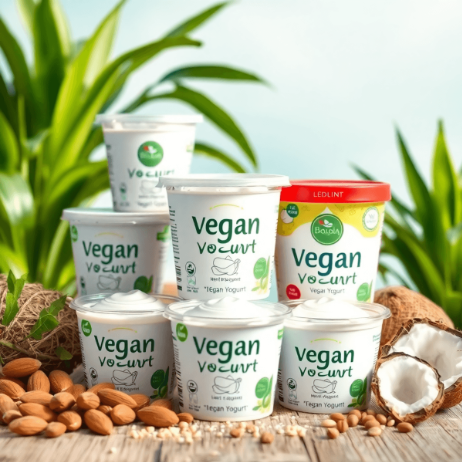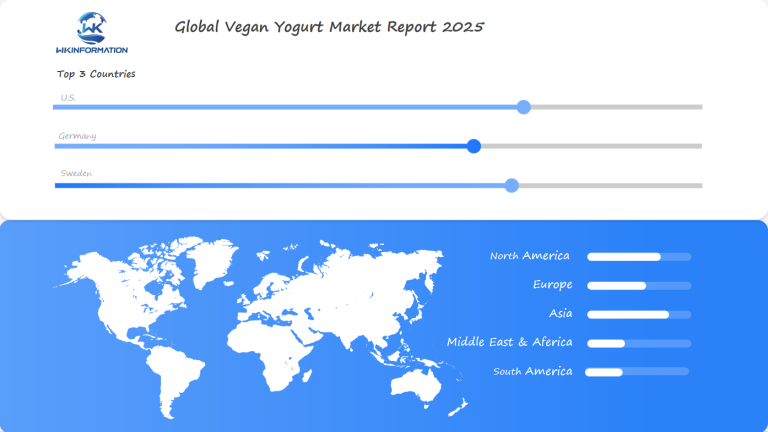2025 Vegan Yogurt Market Boom: Unlocking a $3.40 Billion Opportunity with Sustainable Trends in USA, Germany, and Sweden
Explore the booming vegan yogurt market in the USA, Germany, and Sweden as consumer preferences shift towards plant-based alternatives. This comprehensive analysis examines market growth, key drivers, regional insights, and future trends in the global vegan yogurt industry.
- Last Updated:
Vegan Yogurt Market: Q1 and Q2 2025 Predictions
The Vegan Yogurt market is valued at USD 3.40 billion in 2025, with a CAGR of 14.51% from 2025 to 2033. This growth is driven by increasing health awareness and demand for plant-based products. In Q1 2025, the market is expected to generate approximately USD 810 million, with strong contributions from the U.S., Germany, and Sweden, as more consumers shift to dairy-free alternatives. By Q2 2025, the market is projected to rise to around USD 870 million, as innovations in flavor and texture continue to attract a growing number of health-conscious and environmentally aware consumers.

Analyzing the Upstream and Downstream Dynamics in the Vegan Yogurt Market
Understanding the supply chain dynamics of vegan yogurt is crucial for industry stakeholders seeking to capitalize on market growth. Ingredient sourcing plays a pivotal role, with producers relying on diverse raw materials like almonds, soybeans, and coconuts. These ingredients must be sustainably sourced to meet consumer demand for eco-friendly products. Logistics involve complex transportation networks to ensure freshness and quality across vast distances.
In the downstream segment, distribution challenges arise from the need to maintain product integrity during transit and storage. Efficient cold chain logistics are essential to prevent spoilage and extend shelf life. Retail channels, including supermarkets and online platforms, must adapt to the increasing consumer preference for plant-based options.
For stakeholders, a comprehensive grasp of both upstream and downstream dynamics enhances strategic decision-making. It enables producers to streamline operations, reduce costs, and improve market penetration. As the vegan yogurt market progresses towards its projected $3.40 billion valuation by 2025, stakeholders who master these dynamics will likely lead in innovation and consumer satisfaction.
Engaging with these elements not only supports business growth but also aligns with evolving consumer expectations around sustainability and transparency in food production.
Key Trends Shaping the Growth of the Vegan Yogurt Industry
The rise in health awareness is one of the primary drivers behind the burgeoning vegan yogurt market. Consumers are increasingly seeking foods that align with their health goals, prompting a shift towards plant-based diets that offer perceived benefits over traditional dairy. Vegan yogurts, rich in probiotics and free from cholesterol, cater to this demand for healthier dietary options, capturing the attention of health-conscious individuals.
Rising lactose intolerance rates further bolster this trend. An increasing number of consumers are discovering lactose intolerance, leading them to explore dairy-free alternatives that don’t compromise on taste or nutrition. This has propelled vegan yogurt into the spotlight as a viable substitute, accommodating both dietary restrictions and preferences.
Manufacturers are responding by tailoring product development strategies to these evolving consumer needs:
- Ingredient Innovation: Brands are experimenting with varied bases like almond, coconut, and oat to appeal to diverse palates.
- Nutritional Enhancements: Fortification with vitamins and minerals enhances the nutritional profile of these products.
- Flavor Expansion: Introduction of new flavors caters to traditional taste preferences while attracting adventurous eaters.
The convergence of these factors not only drives consumer interest but also shapes the strategic direction for companies aiming to capture a larger share of this expanding market.
Overcoming Challenges in Vegan Yogurt Production and Supply Chains
Producing high-quality vegan yogurt at scale presents several challenges for manufacturers. One of the primary hurdles is production costs, particularly given the expense of sourcing premium plant-based ingredients such as almonds, soy, and coconuts. The need for specialized equipment and processes to maintain the integrity of these ingredients further inflates costs.
Distribution issues also pose significant challenges. Ensuring the widespread availability of vegan yogurt demands robust logistics networks, especially in regions with limited infrastructure. Transportation delays can compromise the freshness and quality of these perishable products.
Competition within the Vegan Yogurt Market adds another layer of complexity. Producers must continuously innovate to differentiate their products, often investing heavily in research and development to create unique flavors or improve texture and taste.
To address these challenges:
- Collaborative partnerships with local suppliers can help in reducing ingredient costs by minimizing transportation expenses.
- Investing in cold chain logistics solutions ensures that products maintain their quality during transit, enhancing shelf-life and consumer satisfaction.
- Leveraging technology-driven distribution models, such as online platforms, can broaden market reach while reducing dependency on traditional retail channels.
By strategically navigating these obstacles, producers can capitalize on the growing demand for vegan yogurt and expand their market presence effectively.

Geopolitical Impact on the Vegan Yogurt Market Expansion
Geopolitical factors play a crucial role in shaping the landscape of the vegan yogurt market, influencing both opportunities and barriers for industry players.
Global Trade Policies and Market Accessibility
Global trade policies often dictate the ease with which international companies can enter new markets. Favorable trade agreements can reduce tariffs and facilitate smoother cross-border transactions, enhancing market accessibility for vegan yogurt producers.
Economic Factors Affecting Pricing Strategies
Economic factors such as currency fluctuations and import-export regulations significantly affect pricing strategies and profit margins. Companies must navigate these complexities to remain competitive in global markets.
Political Stability and Business Operations
Political stability in key regions also impacts business operations, as unstable conditions can lead to disrupted supply chains or sudden changes in regulatory frameworks.
Challenges and Opportunities in Market Expansion
The potential for market expansion is vast, yet challenges persist. For example, exporting vegan yogurt to regions with strict food safety standards requires compliance with local regulations, necessitating additional investments in certification processes. On the flip side, countries with progressive policies toward sustainable foods present lucrative opportunities for growth.
Understanding these dynamics is essential for stakeholders aiming to capitalize on the increasing global demand for plant-based products. By strategically aligning with geopolitical trends, businesses can enhance their market reach and solidify their position within the burgeoning vegan yogurt sector.
Market Segmentation: Types of Vegan Yogurt and Their Key Applications
Vegan yogurt comes in many different types, mainly based on the ingredients used. Each type has its own unique qualities that attract different consumer preferences:
1. Almond Yogurt
Almond yogurt is known for its creamy texture and nutty flavor, making it a popular choice. Its nutritional benefits, packed with healthy fats and low in calories, make it appealing to health-conscious consumers.
2. Soy Yogurt
Soy yogurt is often recognized for its high protein content and smooth texture similar to traditional dairy yogurts. It is an ideal option for those looking for plant-based sources of protein.
3. Coconut Yogurt
Coconut yogurt, with its rich creamy consistency and tropical taste, attracts individuals seeking unique flavors. It is especially favored by people with nut allergies or those who prefer non-soy alternatives.
In addition to being a healthy snack on its own, vegan yogurts have various culinary uses. They can be incorporated into:
- Breakfast Bowls: As a topping for fruits, granola, and seeds.
- Smoothie Bases: Blending perfectly with other ingredients.
- Cooking Ingredients: Serving as a substitute for dairy in recipes such as dressings, dips, and desserts.
These diverse applications highlight the versatility of vegan yogurt in different meal settings and emphasize its growing significance in contemporary diets.
The Role of Vegan Yogurt in the Plant-Based Food Industry
Vegan yogurt plays an important role in the world of plant-based diets, providing a healthy alternative to regular dairy products. As health trends continue to highlight the advantages of plant-based eating, vegan yogurt becomes a popular choice for people looking to cut back on animal products.
Health Benefits:
- Lactose-Free: Perfect for individuals with lactose intolerance, vegan yogurt eliminates digestive discomfort.
- Nutrient-Rich: Often fortified with probiotics and vitamins, these yogurts offer comparable nutrition to dairy counterparts.
- Heart Health: Low in saturated fats, contributing to improved cardiovascular health.
Consumer Appeal:
- Aligns with ethical consumption, appealing to those who prioritize sustainability and animal welfare.
- Offers diverse flavor profiles and textures that cater to varied taste preferences.
Adding vegan yogurt to your daily meals not only helps you achieve your personal health goals but also contributes to larger environmental efforts. Its rising popularity highlights the move towards sustainable eating habits and establishes it as a key player in the Vegan Yogurt Market, showing a growing dedication to healthier lifestyles without sacrificing taste or nutrition.
Regional Insights: Vegan Yogurt Market Growth Across Key Global Regions
Understanding regional dynamics is crucial for grasping the vegan yogurt market’s evolution. North America emerges as a market leader, driven by increasing awareness of dairy alternatives and a strong shift towards healthier eating habits. The demand for plant-based options continues to rise, with consumers prioritizing sustainability and health benefits.
In Europe, the market benefits from a long-standing tradition of vegetarianism and veganism. Countries like Germany are at the forefront, not only in consumption but also in innovation and product development. Health-conscious consumers are keen on exploring new flavors and nutritional profiles offered by vegan yogurts.
Asia-Pacific presents a unique landscape, with its significant vegetarian population contributing to robust market growth. The region’s rising health consciousness aligns well with the benefits of plant-based diets, fueling interest in dairy alternatives like almond and soy-based yogurts. This aligns with findings that suggest a growing body of evidence supports the health benefits of plant-based diets which further drives the demand for vegan products.
Each region displays distinct consumer behaviors and preferences:
- North America: Health education and increasing lactose intolerance awareness drive demand.
- Europe: Innovation and cultural acceptance of plant-based diets boost growth.
- Asia-Pacific: Vegetarianism and health trends support strong market expansion.
These regional insights underscore diverse growth trajectories across global markets, each influenced by specific consumer preferences and cultural factors.

The USA’s Leading Role in the Vegan Yogurt Industry
The United States is currently leading the vegan yogurt market. This growth is primarily driven by a rapidly increasing number of consumers who prioritize health and sustainability. Additionally, there is a growing awareness of lactose intolerance and environmental issues related to traditional dairy production, which further supports this trend.
Key Factors Driving Growth:
- Consumer Demand: The rise of veganism and flexitarian diets is driving up the demand for plant-based alternatives. Consumers are actively seeking products that align with their ethical values, dietary requirements, and health objectives.
- Innovation: U.S.-based companies such as Chobani LLC and General Mills Inc. are at the forefront of innovation, introducing new flavors, improving textures, and enhancing nutritional profiles. Unique flavors like mixed berry and vanilla paired with probiotic benefits have captured the attention of consumers.
- Retail Expansion: Major retailers like Whole Foods Market and Walmart have expanded their offerings of vegan yogurt products. This increased availability makes it easier for consumers to find and try plant-based options.
In this competitive landscape, companies are focusing on setting themselves apart through the use of high-quality ingredients and sustainable practices. They are investing significant resources into research and development in order to meet changing consumer preferences. As this industry continues to grow, it is expected that the influence of the U.S. on global market trends will become even stronger, establishing standards for innovation and sustainability in the vegan yogurt sector.
Germany’s Role in the Growth of Vegan Yogurt
Germany plays a crucial role in the growth and innovation of vegan yogurt. This is mainly due to its strong market for plant-based foods and a culture that values sustainability. More and more German consumers are choosing vegan options, driven by a greater understanding of health benefits and environmental issues.
Leading the Way in Innovation
Germany has become a hub for creative vegan yogurt products. Manufacturers are using advanced food technology to create textures and flavors that compete with traditional dairy yogurts. They are also using locally sourced ingredients like oats and lupins, which supports local farming and appeals to consumers who prefer sustainable sourcing.
Investing in Research and Development
German companies are putting a lot of money into research and development (R&D). They are looking for new ways to improve the nutritional value of vegan yogurts. This includes adding probiotics, vitamins, and minerals to meet the dietary needs of different consumers.
Responding to Consumer Demands
In Germany, there is a growing preference for clean-label products. This has prompted manufacturers to create offerings that do not contain artificial additives, ensuring transparency in ingredient sourcing. As a result, there is an increasing variety of organic vegan yogurt options available in stores.
Germany’s contribution to the vegan yogurt industry shows its dedication to quality and sustainability. It is positioning itself as a leader in the European plant-based market.
Sweden’s Growing Demand for Vegan Yogurt and Dairy Alternatives
Sweden is experiencing a significant increase in interest towards vegan yogurt and dairy alternatives. This growth is primarily driven by two factors: a rising awareness of sustainability issues and changing dietary preferences. Swedish consumers are increasingly adopting plant-based diets, which aligns with the country’s strong commitment to environmental sustainability. As a result, there is a growing demand for vegan yogurt products that not only offer health benefits but also promote ecological responsibility.
Oat-Based Yogurts on the Rise
The Swedish market has shown a clear preference for oat-based yogurts. This can be attributed to the country’s long-standing relationship with oats as a staple food crop. Oats are known for their nutritional value and low environmental impact, making oat-based yogurt an appealing choice for eco-conscious consumers. Additionally, other varieties such as soy and almond milk yogurts are also gaining popularity among those seeking diverse flavors and textures.
Retailers Responding to Consumer Demand
In response to this increasing demand, retailers across Sweden are expanding their selection of vegan yogurt products. Supermarkets and specialized health food stores are now stocking a wider range of these alternatives, making them more accessible to consumers. This shift not only reflects consumer preferences but also aligns with the broader trend towards plant-based lifestyles in Sweden.
Opportunities for Innovation
The surge in demand for vegan yogurt presents opportunities for both local startups and established brands to innovate within this sector. There is potential for introducing new flavors and formulations that cater specifically to Swedish tastes. By tapping into this market, businesses can contribute to the growing movement of sustainable living while also meeting consumer needs.
Overall, Sweden’s increasing interest in vegan yogurt and dairy alternatives signifies a positive shift towards healthier eating habits and environmental consciousness.
Innovations and Future Trends in Vegan Yogurt Products
The vegan yogurt space is buzzing with product innovation, capturing consumer interest with exciting new formulations and flavors. Brands are experimenting with ingredients to enhance texture and taste, making plant-based yogurts more appealing to a wider audience.
Current Innovations
- Flavor Innovations: New flavors such as mango chili, matcha green tea, and lavender honey are setting trends. These bold options cater to adventurous palates seeking something beyond the traditional vanilla or berry.
- Nutritional Enhancements: Consumers are drawn to yogurts fortified with probiotics, omega-3s, and added proteins. Brands like Chobani LLC are incorporating superfoods like chia seeds and spirulina for added health benefits.
- Sustainable Packaging: Companies are focusing on eco-friendly packaging solutions, reducing plastic use by opting for biodegradable materials. This aligns with the growing consumer demand for sustainability.
Future Trends
Looking ahead, several trends are poised to shape future product development:
- Functional Ingredients: Expect an increase in functional additives aimed at boosting immunity or enhancing gut health.
- Personalization: Customizable products that allow consumers to tailor their yogurt experience with specific flavors or nutritional boosts could become popular.
- Local Sourcing: A trend towards using locally sourced ingredients will likely gain traction, supporting regional economies and reducing carbon footprints.
This synergy of creativity and health-consciousness continues to drive the vegan yogurt market forward, signaling a bright future for innovative plant-based offerings.
Key Competitors in the Vegan Yogurt Market
The vegan yogurt market is rapidly expanding, driven by innovation and consumer demand. Several key competitors play important roles in shaping this industry, each contributing to its dynamic landscape.
- Danone S.A. – France
- Daiya Foods Inc. – Canada
- General Mills Inc. – USA
- Nancy’s Probiotic Foods – USA
- COYO Pty Ltd. – Australia
- Chobani, LLC – USA
- Kite Hill – USA
- The Hain Celestial Group Inc. – USA
- Stonyfield Farm, Inc. – USA
- Forager Project LLC – USA
Overall
| Report Metric | Details |
|---|---|
| Report Name | Global Vegan Yogurt Market Market Report |
| Base Year | 2024 |
| Segment by Type |
· Almond Yogurt · Soy Yogurt · Coconut Yogurt |
| Segment by Application |
· Supermarkets/Hypermarkets · Convenience Stores · Health Food Stores · Online Retail |
| Geographies Covered |
· North America (United States, Canada) · Europe (Germany, France, UK, Italy, Russia) · Asia-Pacific (China, Japan, South Korea, Taiwan) · Southeast Asia (India) · Latin America (Mexico, Brazil) |
| Forecast units | USD million in value |
| Report coverage | Revenue and volume forecast, company share, competitive landscape, growth factors and trends |
The vegan yogurt market is rapidly growing into a multi-billion-dollar industry. This growth is driven by the increasing consumer demand for sustainable and health-conscious food options, especially in regions like North America and Asia-Pacific. Major companies such as Danone S.A., General Mills Inc., and Oatly A.B. are actively investing in innovation and sustainability to expand their market presence.
Several factors contribute to this expansion:
- Health Trends: The rise in lactose intolerance and increased awareness of plant-based diets drive more consumers towards vegan yogurt.
- Product Diversity: With options ranging from almond to soy and coconut-based yogurts, the market caters to varied consumer preferences.
- Distribution Channels: While supermarkets dominate sales, online platforms are increasingly capturing consumer interest.
Challenges remain, including high production costs and texture issues compared to dairy alternatives. However, ongoing improvements in recipes and flavors continue to change how consumers view these products.
This ever-changing landscape emphasizes the need to stay aware of consumer trends. Industry stakeholders must find ways to overcome challenges while taking advantage of opportunities created by changing dietary habits and regional market dynamics. As innovation continues to shape future developments, the vegan yogurt market is set for significant growth, offering a promising future for those who adapt strategically.
Global Vegan Yogurt Market Report (Can Read by Free sample) – Table of Contents
Chapter 1: Vegan Yogurt Market Analysis Overview
- Competitive Forces Analysis (Porter’s Five Forces)
- Strategic Growth Assessment (Ansoff Matrix)
- Industry Value Chain Insights
- Regional Trends and Key Market Drivers
- Vegan YogurtMarket Segmentation Overview
Chapter 2: Competitive Landscape
- Global Vegan Yogurtplayers and Regional Insights
- Key Players and Market Share Analysis
- Sales Trends of Leading Companies
- Year-on-Year Performance Insights
- Competitive Strategies and Market Positioning
- Key Differentiators and Strategic Moves
Chapter 3: Vegan Yogurt Market Segmentation Analysis
- Key Data and Visual Insights
- Trends, Growth Rates, and Drivers
- Segment Dynamics and Insights
- Detailed Market Analysis by Segment
Chapter 4: Regional Market Performance
- Consumer Trends by Region
- Historical Data and Growth Forecasts
- Regional Growth Factors
- Economic, Demographic, and Technological Impacts
- Challenges and Opportunities in Key Regions
- Regional Trends and Market Shifts
- Key Cities and High-Demand Areas
Chapter 5: Vegan Yogurt Emerging and Untapped Markets
- Growth Potential in Secondary Regions
- Trends, Challenges, and Opportunities
Chapter 6: Product and Application Segmentation
- Product Types and Innovation Trends
- Application-Based Market Insights
Chapter 7: Vegan Yogurt Consumer Insights
- Demographics and Buying Behaviors
- Target Audience Profiles
Chapter 8: Key Findings and Recommendations
- Summary ofVegan Yogurt Market Insights
- Actionable Recommendations for Stakeholders

Access the study in MULTIPLEFORMATS
Didn’t find what you’re looking for?
TALK TO OUR ANALYST TEAM
Need something within your budget?
NO WORRIES! WE GOT YOU COVERED!
Call us on: +1-866-739-3133
Email: infor@wkinformation.com
What are the key factors influencing the vegan yogurt supply chain?
The key factors influencing the vegan yogurt supply chain include ingredient sourcing, production dynamics, and distribution challenges. Understanding both upstream and downstream dynamics is crucial for industry stakeholders to optimize production and ensure efficient distribution.
What trends are driving consumer interest in vegan yogurt?
Major trends driving consumer interest in vegan yogurt include increasing health awareness, rising rates of lactose intolerance, and diverse dietary preferences. These trends are shaping product development strategies among manufacturers, leading to a wider variety of options available to consumers.
What challenges do producers face in vegan yogurt production?
Producers face several challenges in formulating high-quality vegan yogurts at scale, including high production costs and regional distribution issues. Competition within the market also adds pressure to maintain quality while managing expenses.
How do geopolitical factors impact the vegan yogurt market?
Geopolitical factors such as global trade policies and economic conditions can significantly influence market accessibility for international players looking to enter the growing vegan yogurt market. These factors can either facilitate or hinder expansion efforts.
What types of vegan yogurt are available on the market?
Vegan yogurts can be segmented based on their ingredient sources, with popular types including almond yogurt, soy yogurt, and coconut yogurt. Each type has unique characteristics and can be used in various applications beyond being a standalone snack option.
Who are the major competitors in the vegan yogurt industry?
Key competitors in the vegan yogurt market include Oatly A.B., General Mills Inc., and other notable brands. Analyzing their market share percentages provides insight into competitive dynamics within this rapidly growing industry.


